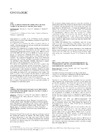Please use this identifier to cite or link to this item:
https://accedacris.ulpgc.es/handle/10553/74264
| Title: | Evaluation of synthetic chalcones on cell viability of human leukemia cell lines | Authors: | Saavedra Díaz, Ester Gloria Loro Ferrer, Juan Francisco Estévez Rosas, Francisco Jesús Del Rosario García, Henoc Quintana Aguiar, José Martín Brouard Martín,Ignacio |
UNESCO Clasification: | 32 Ciencias médicas 3209 Farmacología 320713 Oncología |
Keywords: | Synthetic chalcones Leukemia |
Issue Date: | 2015 | Journal: | Basic and Clinical Pharmacology and Toxicology | Conference: | 36 Congreso de la Sociedad Española de Farmacología (SEF) | Abstract: | P-glycoprotein is a member of the ATP-binding cassette transporter family which is involved in the multidrug resistance of cancer cells to several anti-cancer drugs. To synthesize and to determine the effects of selected chalcones on viability of human leukemia cell lines and in particular P-glycoproteinoverexpressing K-562/ADR cells. Chalcones were synthesized by a Claisen–Schmidt condensation of 2- hydroxyacetophenones and benzaldehydes and their structures were determined by spectroscopic analyses. HL-60, U-937, MOLT-3, K-562 and K-562/ADR cells were grown in RPMI 1640 medium and cytotoxicity was analyzed by colorimetric MTT assay. Cell cycle phase distribution and reactive oxygen species were determined by flow cytometry. The evaluation of apoptosis was carried out by fluorescent microscopy, flow cytometry and DNA fragmentation. Caspase activity was determined using colorimetric substrates, processing of caspases and release of mitochondrial proteins by Western blot. We evaluated the antiproliferative activity of seventeen synthetic chalcones against human leukemia cell lines and found that 20-hydroxy-60 -benzyloxy-4-bromochalcone was the most potent, showing IC50 values of approximately 5 mM, including the multidrug resistant K-562/ADR. This compound induced apoptosis in a concentration- and time-dependent manner and blocked cell cycle progression at the S phase. Cell death was found to be associated with the release of mitochondrial pro-apoptotic proteins, the cleavage and activation of caspases and an increase of intracellular reactive oxygen species generation. The selected chalcone effectively induces cell death in leukemia cells that overexpress P-glycoprotein and could be a potential candidate for developing novel anti-cancer agents. | URI: | https://accedacris.ulpgc.es/handle/10553/74264 | ISSN: | 1742-7835 | Source: | Basic & Clinical Pharmacology & Toxicology [ISSN 1742-7835], v. 117 (sup. 2), p. 42, Abstract C029, (Diciembre 2015) |
| Appears in Collections: | Póster de congreso |
Page view(s)
185
checked on Jan 11, 2025
Download(s)
28
checked on Jan 11, 2025
Google ScholarTM
Check
Share
Export metadata
Items in accedaCRIS are protected by copyright, with all rights reserved, unless otherwise indicated.
